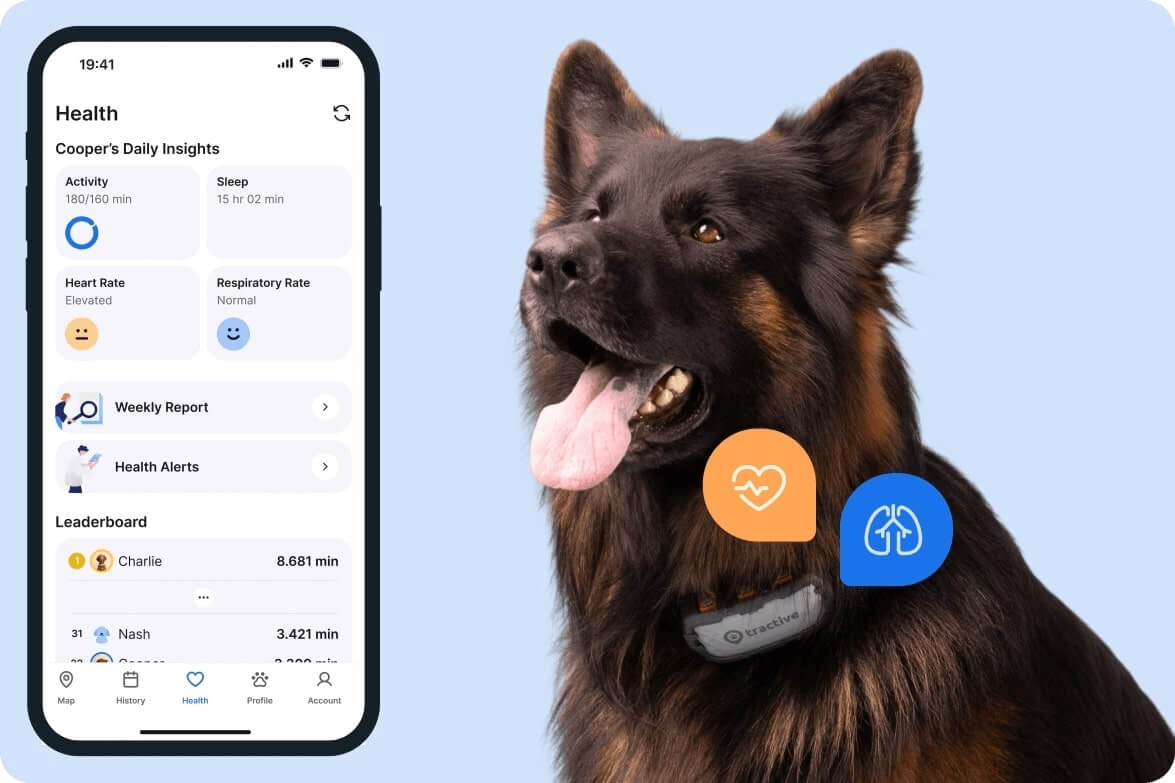 Approved by Dr. Dwight Alleyne, DVM
Approved by Dr. Dwight Alleyne, DVM Dog Coughing And Gagging: Common Causes, Symptoms And Treatment
When a dog coughs or gags, it could signal a simple throat irritation or a serious illness. Learn why dogs cough or gag and how to help your pup feel better when it happens.

Coughing in dogs is natural – it helps to clear irritants like dust, pollen, or mucus from the airway. Occasional coughing in your dog is not a cause for concern. But a dog coughing excessively may be a sign of illness in dogs – such as heart disease, infection, or a breathing obstruction – and some of these ailments can be life-threatening. Read on to learn about the different types of coughing in dogs and what you can do to take care of your canine loved one.
Key Takeaways
- Coughing and gagging in dogs can result from infections (e.g., kennel cough), heart disease, allergies, or foreign objects stuck in the throat.
- Head to your vet if symptoms last more than a few days, worsen, or involve choking, blue gums, or fainting.
- Keeping up with vaccinations, avoiding exposure to sick dogs, and regular vet check-ups help reduce the risk of serious issues.
- A smart dog tracker helps you notice changes in your dog’s health and vital signs, including their breathing rate.

Always know your buddy is healthy & safe
Read more- Why do dogs cough?
- Dog coughing vs dog gagging: how to tell the difference
- What are the various types of dog coughs?
- What are the symptoms of kennel cough?
- Why is my dog coughing? 7 common causes of dog cough
- What to do when your dog is coughing
- Home remedies for dog cough
- When should I bring my dog to a vet?
- How to prevent coughs in dogs?
Why do dogs cough?
Coughing is the body’s reaction to an irritant in the airway. As your pet explores the world with their nose or mouth, they encounter germs, dirt, tiny bugs, bits of grass, and many other particles. If some of this material is breathed in, your dog may cough to expel it. No big deal, right?
If your furry friend coughs frequently, coughs in their sleep, or can’t seem to stop coughing once they start, it’s time to take a closer look. And if the coughing is accompanied by changes in breathing, it could indicate something more serious.
Dog coughing vs dog gagging: how to tell the difference
Coughing and gagging may sound similar when they happen, but they are not quite the same.
- Coughing is caused when your dog forces air out of the mouth and throat.
- Gagging is more akin to vomiting, but nothing comes out except some phlegm or mucus.
Gagging can lead to coughing and coughing can lead to gagging, but either can happen on its own. Gagging is often the result of your dog gulping down large chunks of dry food or swallowing something distasteful. Gagging is a natural process to rid the body of the swallowed or partially-swallowed item.
What are the various types of dog coughs?
If you’ve ever had a cough (and who hasn’t?), you know a cough can be just plain annoying or totally exhausting, especially if coughing interrupts sleep. Your pooch feels the same way! Take action sooner rather than later to help your pup recover from the cough and head off a more serious illness. Your pet’s health and well-being depend on you.
Pay attention to how your dog’s cough sounds so you can describe it to your veterinarian. This will help your vet decide the best way to care for the cough and make your pooch more comfortable. Which category below best describes your dog’s cough?
- Dry, hacking, cough that is deep-sounding
- Gagging and high-pitched cough
- Wet and phlegmy
- Deep and honking, like a goose
Each type of cough indicates a different problem. Take a video of your dog coughing and show it to your vet. This will help the vet decide if the cough signals an emergency or could be contagious, like kennel cough or canine influenza.

Get health alerts for your dog
Our pups can’t always tell us if something’s wrong. But if their tracker detects unusual changes in their routine, you’ll get an alert, helping you catch potential issues early.
What are the symptoms of kennel cough?
Kennel cough typically causes your dog to produce a deep, dry, honking cough. The term “kennel cough” is a catchall for any inflammation of the dog’s trachea and lower airways. Kennel cough is caused by several types of bacteria or viruses, but it produces only mild illness. If left untreated, kennel cough can move into your dog’s lungs, leading to more severe problems like pneumonia or chronic bronchitis.
Kennel cough is highly contagious and is often spread in group settings such as obedience classes, boarding facilities, or dog parks. Your veterinarian can prescribe medication to alleviate the cough. Be sure to keep your pup away from other dogs until they are no longer contagious.
The Bordetella vaccine can protect your dog from getting kennel cough. It can be administered as an injection or nasal spray. Talk to your vet about this vaccine, especially if your dog is boarded frequently.
Why is my dog coughing? 7 common causes of dog cough
Foreign objects in the throat
Dogs sometimes swallow things that they shouldn’t, or they play with sticks or bones that can splinter and lodge in the throat. Coughing is your dog’s attempt to expel the foreign object. But if the foreign object is wedged tightly in the throat, your dog won’t be able to clear it. Look around for clues to determine if your dog recently chewed on or ate something that could have lodged in the throat. If you suspect a foreign object is lodged in the throat, seek veterinary care as this could block the airway or cause infection.
Sometimes, the cough or gag is a result of your dog eating too fast and the food going down the “wrong pipe” (the trachea, which leads to the lungs, instead of the esophagus, which leads to the stomach). Just keep a close eye on your pup after an incident like this.
Environmental allergens
Pollen, smoke, fungi, and other inhaled allergens can cause coughing in your dog. If your dog has allergies, consider keeping them indoors during peak allergy season, or ask your veterinarian for medication to alleviate the symptoms.
Dog Allergies: What You Need To Know
Tracheal collapse
If your dog experiences tracheal collapse, their cough may sound like a honking goose. Toy dog breeds and obese dogs have an increased risk of developing a collapsed trachea. Tracheal collapse occurs when the cartilage surrounding the airway weakens. Treatment for a collapsing trachea includes weight loss and medication to reduce coughing.
Pneumonia
A wet, phlegmy cough may indicate a buildup of fluid in the lungs. If the fluid becomes infected, then your dog will have pneumonia. This is a serious condition that requires immediate veterinary attention to protect your pet’s health. One way to know if your dog might have pneumonia is to watch their breathing. If breathing is labored even when the dog is resting and not coughing, that may be a sign of pneumonia.
Heart disease
When your dog’s heart is not pumping effectively, fluid may start to accumulate around the lungs, resulting in a cough. You may notice the cough becoming more prevalent when your dog is lying down. Heart disease is more likely to occur in older dogs. Don’t put off a call to your vet – this is a serious condition.
Canine influenza
Coughing, along with sneezing, runny nose, runny eyes, fever, and lethargy can signal canine influenza (dog flu). Ask your vet about supportive care for your pup, such as fluids and other medications to reduce fevers. It’s important to alert your vet in advance if you are bringing a dog with canine influenza to the office – they may wish to keep your dog away from other pets to prevent the spread of dog flu.
Canine chronic bronchitis
When the tiny branches of your dog’s lower airways become inflamed, a persistent cough can develop. If your dog has coughed daily for more than two months, they may have canine chronic bronchitis. This chronic condition is unlikely to resolve, so treatment focuses on addressing the symptoms.
Other potential reasons for a dog coughing
Other reasons for coughing in dogs include the following:
- Heartworm disease – which shouldn’t be a problem if your pup is on regular heartworm medication.
- Reverse sneezing (paroxysmal respiration) may seem like coughing, but it’s not. In a reverse sneezing episode, a dog actually sucks air in rather than forcing it out. The reverse sneezing attack may last up to a minute, then it’s over – and your dog will probably act like nothing happened. Don’t be alarmed, but keep track of how often this happens. If reverse sneezing becomes a daily occurrence, contact your vet to rule out any other conditions.
- Laryngeal paralysis is another condition that may seem cough-related. In laryngeal paralysis, the muscles that surround the voice box (larynx) become weak. Your pup may pant loudly and their voice may change. Always see your veterinarian when your dog experiences changes in breathing.
- Lung cancer can also cause persistent coughing in dogs. But lung cancer is not a common reason that dogs experience coughing.
What to do when your dog is coughing
Coughing is uncomfortable for your dog and can be tough to listen to for days on end. Plus, it can be a sign of a serious or contagious illness. Do your dog and yourself a favor and seek treatment as soon as possible. Your pet’s health is worth it.
Once your veterinarian finds out what’s causing the cough, they will be able to prescribe treatment. And if your dog has a life-threatening underlying cause, beginning treatment early can improve the outcome for your dog.
Home remedies for dog cough
Persistent coughing can irritate the throat. So here are a couple of home remedies you could try:
- Soothe your pup’s throat with honey. Add a spoonful of honey to a bowl of water, up to three times per day.
- Place a small humidifier near your dog’s bed can keep your pet’s throat from drying out.
- If you don’t have a humidifier, invite your pup into the bathroom while you shower (but not in the actual shower or tub) for a bit of steam therapy. Close the bathroom door so the room gets extra steamy.
- Allowing your dog to plenty of rest is important for recovery form any illness. Don’t force them to go on walks or engage in vigorous play. Their body just needs time to recover.
When should I bring my dog to a vet?
Most cases of coughing in dogs are completely treatable. But your dog’s condition needs to be diagnosed in order be treated, so that means a trip to the vet. Bring along a video of your dog coughing in case your pup doesn’t cough during the appointment.
Bring your dog to the vet if your dog experiences any of these:
- Your dog’s cough is getting worse
- Your dog’s cough lasts more than 5 days
- Your dog coughs after exercise
- Your dog coughs after drinking or eating food
- Your dog coughs even when resting
- Lethargy
- Fever
- Loss of appetite
- Labored breathing
How to prevent coughs in dogs?
Sometimes, there isn’t any way to prevent coughing or gagging in your dog. But you can take some simple precautions to avoid life-threatening illness.
- Keep your pup current on all vaccinations including the kennel cough vaccine.
- Keep them away from unvaccinated or sick dogs.
- Regular vet checkups can help with prevention, safeguard your pet’s health, and catch serious illnesses before they progress.
You can also track everywhere your dog goes, plus their health, activity, sleep and more with a GPS and health tracker for dogs.

If your dog does get treated for a cough, follow your vet’s instructions after your visit. Administer all of the medication, including the full course of antibiotics if prescribed. Rest and sleep are important for your pet’s health and recovery. Soon your energetic and loving pup will back to their best self!
Your furry friend’s health and wellbeing means as much as to us as it does to you. So we’ve made it a priority to only share medically-relevant content on our blog. This post was checked, double-checked, and medically verified by Georgia-based vet, Dr. Dwight Alleyne.

Dr. Dwight Alleyne, DVM
Originally from Long Island, New York, Dr. Alleyne began his career at a no-kill animal shelter before becoming a licensed veterinary technician. He graduated from Cornell University Veterinary College in 2006 and completed an internship at Purdue University. Now practicing in Georgia, Dr. Alleyne specializes in soft tissue surgery and ultrasounds. He also writes pet health articles on his website, “The Animal Doctor Blog” (www.anmldrblog.com).




